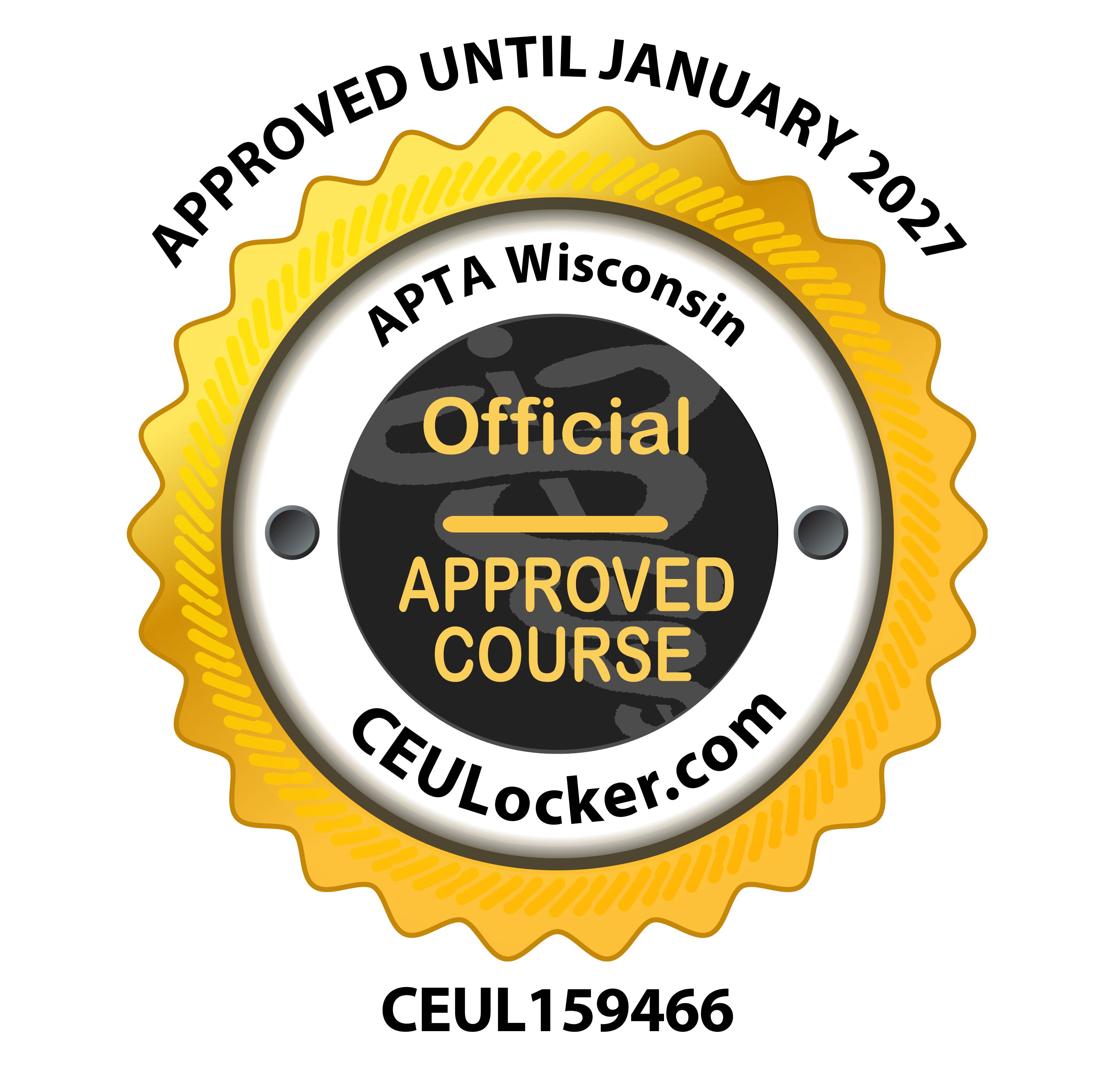Course Instructor: Colleen Sleik PT, DPT, NCS, GCS
Intended Audience: Physical Therapists, Physical Therapist Assistants and Occupational Therapists
Educational Level: Introductory
Instructional Methods: Demonstration, video, case studies, large group activities, large and small group discussion
Delivery Method: Hybrid
Course Fee: $395
Fundamentals of Vestibular Rehab offers an introduction to vestibular rehab to include anatomy, physiology, and pathophysiology of central and peripheral origin. Differential diagnosis tests and measures will be applied to differentiate central and peripheral origin of dizziness. Specific emphasis will be placed on understanding of peripheral and central causes of dizziness, including benign paroxysmal positional vertigo (BPPV), vestibular hypofunction, stroke, neurodegenerative diseases, and multisensory dizziness. Principles of assessment and differential diagnosis will improve the clinician’s efficiency in examination and translation of exam findings into the development of an effective, evidence-based treatment plan.
This is a lab-based course with instruction in assessment and treatment techniques for differential diagnosis, BPPV, vestibular hypofunction, and modification of vestibular rehab treatment techniques for dizziness of central and cervicogenic origin.
Approved by APTA WI, NJ, PA, NY, and AOTA for 10 Contact Hours. Pending approval by APTA OH.
LEARNING OUTCOMES
- Explain how the visual, vestibular and somatosensory systems function together to maintain balance.
- Describe the role of the cerebellum in the function of balance and control of vision as it contributes to safety with daily activities.
- Name the components of the HINTS exam and apply them to differential diagnosis.
- Identify key exam procedures and findings to differentiate dizziness of central and peripheral origin.
- List contraindications for BPPV positional testing.
- Describe testing procedure, findings and treatment of posterior canal BPPV.
- Interpret the findings of the Roll test and Bow and Lean test in diagnosing horizontal canal BPPV.
- Name the 4 components of vestibular rehab and their role in restoring balance and vision to restore function in activities of daily living.


Focus on Function Physical Therapy, PC is an AOTA Approved Provider of professional development. Course approval ID# 8879. This hybrid course is offered at 10 contact hours, intermediate educational level, foundational knowledge. The assignment of AOTA CEUs does not imply endorsement of specific course content, products, or clinical procedures by AOTA.
Instructor

Colleen Sleik PT, DPT, NCS, GCS
Physical Therapist
Other Courses
-

Vestibular Rehab Certificate for Clinicians Part 1: Foundation
Course5.0 average rating (9 reviews)This self-paced, online course in vestibular rehabilitation breaks down complex concepts in a logical progression. Topics include anatomy, vestibular pathology, assessment, differential diagnosis and treatment, concluding with case study analysis.
$299
-

Current Concepts in Concussion Management: A Strategic Approach to Rehab
CourseSpecialists in physical therapy, neuro-optometry, and neuropsychology set the foundation for concussion management from a multi-disciplinary perspective, covering the clinical domains and offering many clinical pearls along the way!
$299
-

Vestibular 101: Basic Clinical Competency
Course5.0 average rating (1 review)This course was created to help organizations develop a baseline vestibular competency for staff to ensure competency in assessment and treatment of basic vestibular diagnoses.
$75
Course curriculum
-
-
Fundamentals of Vestibular Rehab - Course Description, Objectives and Weekend Schedule
-
Fundamentals of Vestibular Rehab: Handouts for Online Content
-
Vestibular Anatomy and Physiology
-
Aging Vestibular System
-
Benign Paroxysmal Positional Vertigo: BPPV
-
Peripheral: Vestibular Hypofunction
-
Meniere's Disease
-
Central Dizziness
-
Vestibular Migraine
-
Cervicogenic Dizziness
-
Nystagmus
-
Are Video Goggles Necessary?
-
Nystagmus video: Right Torsional Up-beating
-
Nystagmus video: Left Torsional Up-beating Nystagmus
-
Nystagmus video: Right Torsional Down-beating
-
Subjective Exam
-
Differential Diagnosis
-
Quiz
-
-
-
Weekend Handouts
-
Review of Anatomy and Physiology
-
Pathophysiology of BPPV
-
Nystagmus
-
BPPV Assessment and Treatment Lab
-
Lunch
-
BPPV Large Group Activity
-
Pathophysiology of Dizziness, non-BPPV
-
Differential Diagnosis and Lab
-
Vestibular Rehab Treatment Techniques and Lab
-
Case Studies
-
Question and Answer
-
Course Survey
-

About this course
- 2.5 hours of video content


